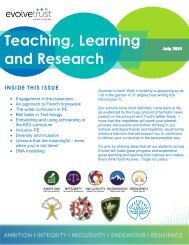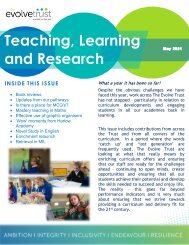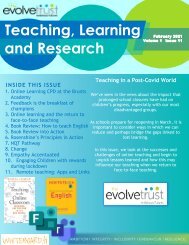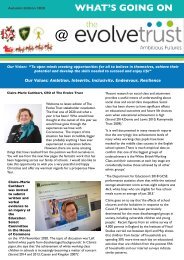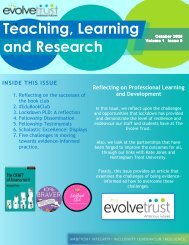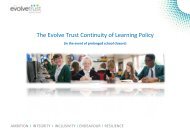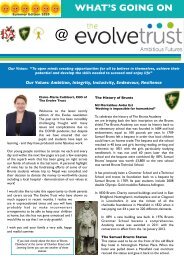Summer 1 Teaching and Learning Newsletter
You also want an ePaper? Increase the reach of your titles
YUMPU automatically turns print PDFs into web optimized ePapers that Google loves.
Engaging Parents During School
Closures
By Janet Goodall ‘
Page 7
Teachers and other school staff face new challenges during this extraordinary time, as they support families
at home. This article aims to provide some support and advice around these unique challenges, drawing on
a range of research about parental engagement, but should also provide insight for work in schools far
beyond the present circumstances.
Homes, not classrooms
The first thing to say is that these are extraordinary times, and we shouldn’t be trying to recreate
classrooms at home, or recreate the same style of learning at home that would generally happen in the
classroom – first, because it’s simply impossible, and second, because it wouldn’t work.
Homes are, in general, not classrooms and rarely contain the numbers of children that inhabit most
classrooms. School settings have evolved to be efficient (more or less) in providing education to groups of
children – groups who are gathered together by age, rather than by being members of the same family.
Although a good many teachers are parents, most parents are not classroom teachers, and we’re not going
to turn them into classroom teachers overnight – and we shouldn’t be trying to. That’s not what their
children and young people need at the moment.
In teaching, writing and presenting over the last 10 years or so, I’ve often asked school leaders to consider
what’s really important in schooling – to think about what schools are for, and to concentrate on that.
Schools were originally set up to enable groups of children to learn the things that society deemed were
important for them to know (Goodall, 2017), and have come a very long way in being able to do that,
mainly through the dedication and professionalism of the staff within the school walls.
Now, though, we need to get back to those basics, to become radical if you like (the word means ‘root’) –
what’s really important for our children to learn? To do, to be, to become?
And how can we help families support that learning? Now, more than ever, we need to see growing
partnerships between school staff and other families – and I say ‘other’ because one facet of the whole
debate that seems to be ignored is just how many school staff are themselves parents or carers…
The value of parental engagement
Research has shown the value of parental engagement for many years – the more that parents are involved
with learning, the more that children attend school, the more that homework is done, the more that
behaviour improves and children achieve more; there’s more than enough evidence to show this (Fan and
Chen, 2001; Fan and Williams, 2010; Hornby, 2011; Jeynes, 2012, 2014, 2018).
But it’s important to understand what ‘parental engagement with learning’ actually means – it doesn’t
mean coming into school, and it doesn’t necessarily mean checking on homework (and it never has);
effective parental engagement with learning means the attitude towards and support for learning in the
home (Goodall and Montgomery, 2014). So supporting parental engagement isn’t about just giving young
people more homework or worksheets; it’s about ensuring that young people have the best opportunities
for learning that we – as a society – can provide. (And I would argue that that should always have been the
point of homework, anyway (Goodall, 2020)).
Parents (those who are not teachers already) are not going to turn into professional teachers overnight
(consider how much training you had before you stepped into the classroom and how much you’ve
continued to learn since that first day!). We need to stop thinking about ‘what we would have done if they
were still in school’ and start thinking about ‘how we can support learning now that they’re not in school’.







